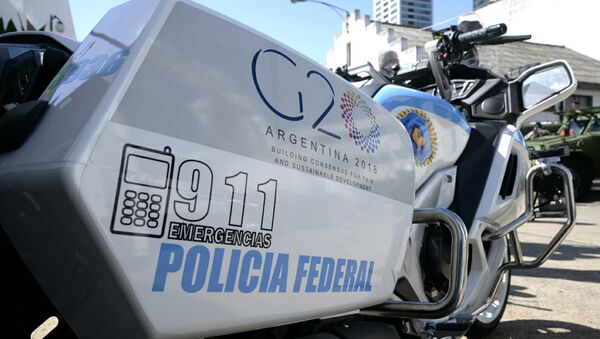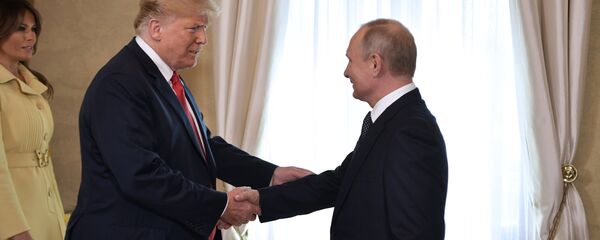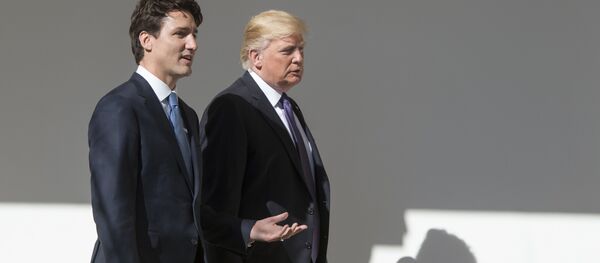The summit in Argentina took place amid a difficult backdrop — escalation in the US-Chinese trade war, a naval incident between Ukraine and Russia, and a growing pressure on Saudi Crown Prince Mohammed bin Salman who is being suspected of ordering the killing of journalist Jamal Khashoggi.
READ MORE: Macron Reveals What He Told Saudi Crown Prince During G20
Leaders of industrialized nations located across the globe took part in the summit, namely, Russian President Vladimir Putin, US President Donald Trump, French President Emmanuel Macron, Chinese President Xi Jinping, and Argentine President Mauricio Macri — the host of the summit.
German Chancellor Angela Merkel missed the first day of the summit, during which she planned to hold talks with Macri, Trump and Xi, as her plane made an emergency landing late on Thursday en route to Argentina due to a technical malfunction on board.
Pre-Summit Activities
The pre-summit activities began on Monday with two-track meetings of finance deputies and the so-called sherpas. Anti-corruption, education, employment, climate sustainability, and energy transition were on the agenda as well as major finance-related issues that were tackled at the summit later.
On Thursday evening, the G20 finance ministers met for an annual dinner, during which they summarized the work of the finance track.
Day One
The United States and Argentina have signed a new agreement on energy and infrastructure investment cooperation on the sidelines of the G20 summit. Under the deal, the two countries intend to cooperate to integrate cleaner energy sources, including natural gas and renewable energy, to develop natural gas storage capacity, and to develop refined product midstream and downstream infrastructure.
READ MORE: Draft of G20 Final Declaration Ready, But Consultations Still Underway — Source
This came soon after Trump, Canadian Prime Minister Justin Trudeau and then Mexican President Enrique Pena Nieto signed the United States-Mexico-Canada Agreement during a ceremony in Argentina ahead of the start of the summit.
During the first day of the summit, the G20 leaders also discussed the topic of "Building Consensus" at a closed meeting.
Trump and Japanese Prime Minister Shinzo Abe agreed to maintain pressure on North Korea to fulfill its pledge to end its nuclear development program, while they also discussed progress in the US-Japanese cooperation on advancing a free and open Indo-Pacific, as well as next steps to expand collaboration in areas such as energy and infrastructure.
Trump also met with Prime Minister Narendra Modi of India at the first ever United States-India-Japan leaders meeting, during which they reaffirmed the importance of the free and open Indo-Pacific vision for global stability and prosperity and pledged to deepen trilateral cooperation.
BRICS Meeting on Summit Sidelines
The BRICS leaders called on the global community to resist to unilateral and protectionist measures within the World Trade Organization (WTO), while they also called for joint effort on counter-terrorism fight under UN aegis.
"For the long-term stabilization of the situation in Syria, it is important to promote a real process of political settlement. To this end, Russia is working closely with partners within the Astana format — Iran and Turkey. We are aiming at speedy formation and convocation of the constitutional committee in Geneva," Putin said at the BRICS meeting.
He also emphasized that the chemical attack that terrorists carried out in the Syrian city of Aleppo on November 24 must not remain unpunished.
Putin also held talks with his Chinese counterpart on Friday. Putin invited Xi to combine his next year's trip to Russia and attending the St. Petersburg International Economic Forum by becoming the event's main guest. Xi has accepted the invitation of Putin, and also invited him to attend the second edition of the Belt And Road Summit in late April 2019.
READ MORE: Outrage as Argentinian TV Airs 'Racist' Pic to Announce Indian PM's G20 Arrival
Late on Friday, Putin also held a joint meeting with Xi and the Indian leader.
"We believe that the Russia-India-China format of talks is very promising. The cooperation between the three countries may become effective supplement to bilateral cooperation between our countries and [the cooperation] under BRICS," he said.
Day Two
While the Kerch Strait incident and the situation in Syria, namely, the efforts toward the creation of the Syrian constitutional committee, were in the focus of his talks with Merkel, the long-awaited peace treaty between Russia and Japan was the forefront topic at the meeting with Abe.
"I would like to further expand our cooperation in all areas in order to raise Russian-Japanese relations to a new level," Abe said at the meeting.
Putin also held talks with Macri. The two leaders discussed trade ties, particularly boosting Argentina’s export of agricultural goods to Russia as well as Russian investment in Argentine rail transport and shipping industries.
During his talks with Turkish President Recep Tayyip Erdogan, Putin thanked him for joint solution of various issues, calling Ankara a reliable partner of Moscow. Erdogan, in turn, suggested convening a new summit on the situation in the northwestern Syrian province of Idlib.
Trump and South Korean President Moon Jae-in held a meeting, during which they discussed Trump’s plans to hold a second summit with North Korean chairman Kim Jong Un.
READ MORE: Merkel, Trump to Meet on Saturday on Sidelines of G20 Summit — German Government
The two leaders renewed their commitment to achieving the full and verifiable denuclearization of North Korea and maintaining sanctions on Pyongyang until it gives up the nuclear weapons program.
The second working session, dedicated to the global trade, was also held during the final day of the summit.
"Literally everyone opposed trade barriers, protectionism, restrictions creation, and so on… It was said that we were all interested in boosting investment in order to create new jobs. And if there are restrictions in trade and in products distribution, new investments can hardly be discussed," Russian First Deputy Prime Minister and Finance Minister Anton Siluanov said.
Canceled Trump-Putin Meeting
The meeting between Putin and Trump was set to take place on the sidelines of the summit. The two leaders were expected to discuss the 1987 INF Treaty, among other issues, as a source from the Russian delegation told Sputnik on November 11.
However, on Thursday, Trump announced on Twitter that he had decided to cancel the talks after receiving a full report on the naval incident between Russia and Ukraine in the Black Sea. Trump’s announcement came less than an hour after he told reporters before boarding a plane to Argentina that it was a "very good time" to meet with Putin.
READ MORE: Trump: Kerch Strait Incident ‘Sole Reason' for Cancelling G20 Talks With Putin
Putin and Trump greeted each other at the summit but had no time for talks, Kremlin spokesman Dmitry Peskov told Sputnik on Friday.
On Saturday, Peskov said that no conditions could be set for the next Putin-Trump meeting, including those related to the Russian-Ukrainian relations.
"As for the events in the Black Sea, Putin has given exhaustive explanations to his interlocutors — Macron and Merkel. President Trump has not received these explanations as he has canceled the meeting," Peskov told Sputnik.
Final Declaration
According to Svetlana Lukash, Russian G20 sherpa, the discussions of the final declaration were difficult. However, the summit’s participants managed to reach a consensus on the issue.
The declaration, which is available on the G20 official website, consists of 31 articles and an appendix with the list of documents adopted at the level of ministers and the working group.
READ MORE: WATCH Anti-G20 Protests Rock Buenos Aires, Argentina
They reiterated their full commitment to the Paris Agreement on climate change calling the agreement irreversible.
The G20 nations also reaffirmed their commitment to the Hamburg Leaders Statement on Countering Terrorism and pledged to enhance their efforts to combat terrorist and proliferation financing,
The issue of migration, which has been high on the agenda across the globe, was similarly in the summit's focus.
"Large movements of refugees are a global concern with humanitarian, political, social and economic consequences. We emphasize the importance of shared actions to address the root causes of displacement and to respond to growing humanitarian needs," the document said.
Finally, the leaders of the G20 states have agreed on the need for a WTO reform, saying that the system was "falling short of its objectives."
Putin's Presser
At the press conference following the summit, Putin welcomed that the G20 nations had come to a consensus and produced a joint document despite a number of disagreements on migration and trade.
“Yes, one can say that it [the declaration] is general in nature… Maybe, but still, I think it's also for the good. I believe that the Argentina’s [G20] presidency has done everything to ensure that this document has emerged, signed and agreed by all parties,” Putin said, recalling that the recent APEC summit ended with no final declaration adopted.
READ MORE: Summit Host Argentina Gifts G20 Leaders With Local Alpaca Scarves, Mendoza Wine
Putin also commented on a number of international issues, raised during his bilaterals with foreign partners. He, in particular, said that Russia and Saudi Arabia had agreed to sign up to an extended oil cuts deal that will be discussed in Vienna next week by the OPEC group of exporters and other major producers.
In the wake of his meeting with Erdogan, he also reiterated shared Moscow-Ankara concerns about the situation in the Syrian province of Idlib, expressing hope that the joint efforts of the defense ministries and special services of the two nations will result in solving the situation and creating a demilitarized zone in the area as soon as possible.
When asked about the Kerch Strait incident, he reiterated that Moscow sees it as a provocation initiated by the current Ukrainian leadership in the run-up to the March presidential election in the country. He stressed that it was too early to talk about possible exchange of the crews of three Ukrainian naval ships detained in the Kerch Strait, stressing that the investigation into the incident was underway.
Talks With Macri
The press conference was followed by talks with the president of the host nation, Macri. The two nations agreed to work closer together in the fight against crime, and increase trade and investment.
"A hefty batch of bilateral intergovernmental deals and commercial contracts was been inked just now. This is a sign of a mutual intent to expand Russian-Argentine relations in all directions," Putin noted, meaning the deals signed by Russian Railways, Gazprombank and other companies with their Argentine counterparts.
Finally, Argentina and the RT broadcaster signed a deal on Saturday that will allow the Moscow-based television channel to continue airing its shows on the state television network.
Trump-Xi 'Amazing Meeting'
On Saturday evening, the White House finally issued a statement, following what Trump described as an "amazing and productive meeting" with Xi on the summit's sidelines.
READ MORE: Trudeau Urges Trump to Remove Tariffs on Canadian Steel, Aluminum Ahead of G20
Washington announced that Trump agreed to temporarily freeze the plans of raising the tariffs on $200 billion worth of Chinese products from 10 percent to 25 percent starting from January 1, 2019, in order to pave the way for trade talks with Beijing.
“President Trump has agreed that on January 1, 2019, he will leave the tariffs on $200 billion worth of product at the 10% rate, and not raise it to 25% at this time. China will agree to purchase a not yet agreed upon, but very substantial, amount of agricultural, energy, industrial, and other product from the United States to reduce the trade imbalance between our two countries,” the White House's statement said.
The United States however warned that if the trade talks do not succeed within the next 90 days, the tariffs will be raised to 25 percent as planned.
Meanwhile, the Xinhua news agency also reported, citing the Chinese Foreign Ministry, that the two countries had agreed to expedite talks toward eliminating all additional tariffs.






